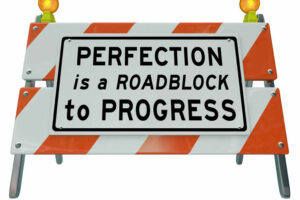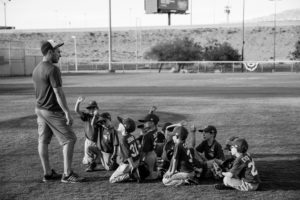A common topic athletes often discuss is communicating with their coach. As we discuss this issue the athlete often discusses frustrations they have with their coach (amount of playing time, feeling there are favorites, feeling misunderstood, or not liked). While the athlete is focusing on the coach and the coach’s behavior I would like them to focus upon themselves.
There is a philosophical question “Are you waiting for the world to change?”. The answer of course is stop waiting and start changing. Changing yourself directs your focus to what you control. If the person or individual starts changing you might just have a positive effect on the world.
When working with an athlete I want them to understand themselves clearly; their motivations, goals, drives, fears and insecurities. Self understanding is required for clear understanding of others as well as development of healthy relationships. If the athlete does not understand themselves they are prone to making a number of common mistakes that will impede their ability to communicate clearly, listen well, take direction and achieve goals.
We start with the question “Are you coach-able?”. Being coach-able requires a set of interpersonal skills which allows the athlete to learn, grow and achieve their potential. The same is true of students. In order to get the most from your education you have to be “teachable”. An example of a professional athlete who was challenging to coach early on was Kobe Bryant. Kobe came into the NBA at 19 years of age. He was physically talented but young and somewhat immature. There was a great deal of hype surrounding Kobe and what he might accomplish. Kobe is also incredibly competitive and wanted to make an immediate impact in the NBA.
Kobe’s youth and desire to be an immediate impact player in the NBA created a scenario where his incredible drive and goals adversely impacted his ability to be patient, listen, accept constructive criticism and become a member of the team. Ironically, Kobe’s coach happened to be Phil Jackson the “guru” of NBA coaches and guide of players Michael Jordan, Scotty Pippen, Dennis Rodman, Shaquille O’Neal, and 10 NBA championships.
Over time Kobe has become more mentally flexible, coach-able and grown to his potential. He continues to be incredibly driven, a physical player and wins championships. Most importantly, Kobe has become coach-able. He his listens to his coaches, listens to his teammates, accepts constructive criticisms and regularly seeks to gain new skills. Kobe has become a true team member, leader and outstanding professional athlete. He has developed the skills of being a listener, accepting constructive criticism, being open to direction, and letting others help him achieve his potential. Kobe, his coach and the Lakers make NBA magic.
To grow to potential an athlete needs to begin by listening. This requires active listening. Active listening requires the athlete to focus on what is being said by the coach, and not thinking about what they want to say in response. When the athlete is thinking about what they want to say in response, they are not open, they are defensive and guarding their ego instead of accepting that they do not know everything and may learn something from their coach. In a nutshell active listening means “be open”.
Second, the athlete needs to understand their emotions and reactions. When being criticized (even caring constructive criticism) some athlete’s emotions over take them and they begin to feel embarrassed, or angry, or stupid, or guilty. When their emotions take over, they become defensive. Like all of us, athletes are people and their childhood experiences have a great deal to do with how they feel and think. Understanding their emotions and the thought process that accompanies their emotions is crucial to an athlete being open to feedback and utilizing it.
If they have openly and actively listened the athlete is now poised to take action. The third step is accepting criticism and defining goals. The athlete can choose to accept the direction or ignore it. If they choose to accept it, the athlete now has helpful information that can improve their skills. Hopefully their coach provided specific examples of how to improve and what to do. If not, the athlete needs to ask questions to clarify what will help them improve and what steps to take.
Another piece of acceptance is being a team player. Every athlete would like to be a star player, however not everyone is. In like kind, a star player is also a team member and has to learn to place team goals above their personal goals. Being a team player is accepting your role on the team, taking control of that role and placing team goals as your priority. If this occurs, the team will succeed and so will the athlete. This process includes not criticizing your teammates or coaches. Part of being team player is being positive, finding solutions and achieving goals.
The fourth step in our process is “trust the plan”. Trusting the plan is following directions, using them as goals to help you improve and seeking feedback. Hopefully the coach is providing feedback, motivating their players and using praise. If the athlete is unsure, they need to step up and ask for feedback about their performance.




